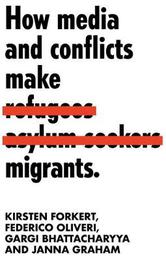
|
How Media and Conflicts Make Migrants
Hardback
Main Details
| Title |
How Media and Conflicts Make Migrants
|
| Authors and Contributors |
By (author) Kirsten Forkert
|
|
By (author) Federico Oliveri
|
|
By (author) Gargi Bhattacharyya
|
|
By (author) Janna Graham
|
| Series | Manchester University Press |
|---|
| Physical Properties |
| Format:Hardback | | Pages:224 | | Dimensions(mm): Height 216,Width 138 |
|
| ISBN/Barcode |
9781526138118
|
| Classifications | Dewey:302.2308691 |
|---|
| Audience | | Tertiary Education (US: College) | | Professional & Vocational | |
|---|
| Illustrations |
15 black & white illustrations
|
|
Publishing Details |
| Publisher |
Manchester University Press
|
| Imprint |
Manchester University Press
|
| Publication Date |
28 April 2020 |
| Publication Country |
United Kingdom
|
Description
Has 'migrant' become an unshakeable identity for some people? How does this happen and what role does the media play in classifying individuals as 'migrants' rather than people? This volume denaturalises the idea of the 'migrant', pointing instead to the array of systems and processes that force this identity on individuals, shaping their interactions with the state and with others. Drawing on a range of empirical fieldwork carried out in the United Kingdom and Italy, the authors examine how media representations construct global conflicts in a climate of changing media habits, widespread mistrust, and fake news. How media and conflicts make migrants argues that listening to those on the sharpest end of the immigration system can provide much-needed perspective on global conflicts and inequalities. In challenging the conventional expectation for immigrants to tell sad stories about their migration journey, the book explores experiences of discrimination as well as acts of resistance. Interludes, interspersed between chapters, explore these issues through songs, jokes and images. Offering an essential account of the interplay between a climate of diversifying but distrustful media use and uncertainty about the shape of global politics, this volume argues that not only is the world itself changing rapidly, but also how people learn about the world. Understanding attitudes to migrants and other apparently 'local' political concerns demands a step back to consider this unstable global context of (mis)understanding. -- .
Author Biography
Kirsten Forkert is a Reader in Media Theory at Birmingham City University Federico Oliveri is a Research Fellow at the University of Pisa Gargi Bhattacharyya is Professor of Sociology at the University of East London Janna Graham is a Lecturer in Visual Cultures at Goldsmiths, University of London -- .
Reviews'Overall, this book offers a new approach to the much-discussed role of international migration in Europe and its media portrayal from a critical postcolonial point of view. Its anecdotal storytelling renders it easier to read, while the formulation of clear appeals or calls to action blurs the line between activism and scholarly research.' Lilian Kruger, The International Spectator 'This volume explores connections between media representations, global migrants, and perceptions upheld and challenged by viewers in the UK and Italy during the 2010s. The text oscillates between chapters that unpack issues like "white amnesia" and "postcolonial innocence" among white, Western viewers, and brief "interlude" chapters that convey migrants' insights into navigating different media perspectives and experiences within their new settings. For instance, the authors note a shift from print to new media consumption that necessitates steady access to the internet and mobile technology, which flies in the face of stagnant images of migrants as "not entitled" to such technology, further limiting their access to and sharing of information. Ultimately, the authors call for building international systems to disrupt the willful "forgetting" of interconnected global histories fueling migrants' voyages, and to help them thrive in their new countries. This book could be useful for courses in political science, media studies, communications, and ethnic studies. Visual pairings might include pertinent excerpts from British and Italian newscasts from the period, along with relevant news articles and online posts, with the potential to integrate these media into a reflective "migrantification" assignment.' CHOICE -- .
|